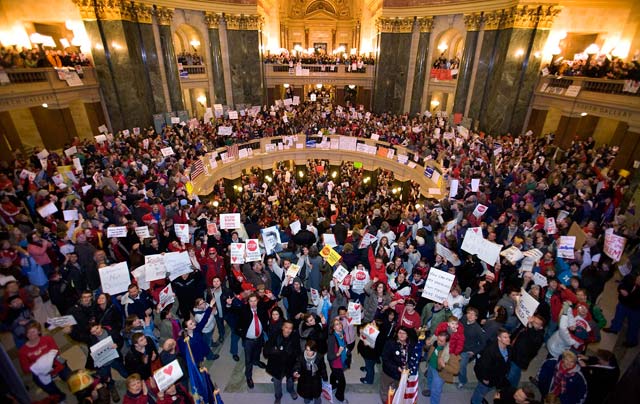Unions Take a Beating in Wisconsin Gubernatorial Recall Vote

In 1959, Wisconsin became the first state in the nation to embrace collective bargaining for their public sector unions. 53 years later, the voters of Wisconsin rebuffed public unions when the attempted recall of Governor Scott Walker fell desperately short of its goal.
What caused the turnabout? Early on, public sector workers were viewed as the “poor cousins” to private sector workers – accepting lower pay in trade for steady employment, good benefits and a generous retirement program.
Today there is a major backlash against public employee unions because of those protected and very expensive benefits and pensions, which are driving state and local governments deep into debt. The public, which used to feel a sense of empathy for underpaid government workers (especially teachers), now feels anger and frustration with a group that is viewed as receiving special treatment even while private sector workers suffer through unemployment as well as eroding or disappearing retirement benefits.
So although Wisconsin is a state that is generally viewed as liberal leaning and pro-union, the very conservative Governor Walker won an even stronger victory in the recall then when he was first elected.
But there was more going on in Wisconsin this week then just a changed attitude toward unions. As IVN writer Heather Rogers pointed out in her article Tuesday, this was a very expensive election. In fact, it was the most expensive in Wisconsin history. This was also one of the first major political exercises under the Citizens United ruling that essentially allows unlimited money to be spent by third party groups on an election and the effect of big money was definitely felt.
"Citizens United has fundamentally changed politics and campaigns. Scott Walker and his soft money Death Star spent over $40 million," said John Lapp, a Democratic operative involved in several House campaigns this year in an interview with National Journal. "If they care about the future of this country and Democratic politics, it's time for progressives of means to wake up and join the fight."
Walker benefited from a surge in contributions from wealthy conservative donors from around the country who raised more than $30 million to his opponent’s $4 million.
“That number was buttressed by a loophole in Wisconsin law that allowed Walker to raise unlimited donations from individuals for months, while [Milwaukee Mayor Tom] Barrett had hard caps on his donations and could only begin fundraising two months ago when the recall became official,” The Hill reported.
The recall election likely strengthened the hand of the state’s anti-union chief executive, could spell bad news for the state’s Democrats, and may end up having a deleterious effect on the Obama campaign.
According to New York Times reporter Michael Shear:
“Even though Mr. Obama kept his distance from the state in the final weeks of the union-led recall effort, the president’s party, his campaign team and his labor allies exerted an enormous joint effort in the state that proved ineffective against an organized and well-funded Republican apparatus.”
All of the conversation about money notwithstanding, union officers and political functionaries have to be feeling disappointed and even depressed by this defeat in a union state. But even the successful Republican Party is aware that it cannot count on the Walker recall results to be duplicated in November when a sitting president goes up against former governor Mitt Romney. Exit polls showed that Obama retains a high level of popularity among the Wisconsin electorate.
There are myriad rationalizations by the losing side as to what went wrong – too much outside money in support of Walker, a poor campaign on the Democratic side, a general dislike of recalls by the electorate – but one strong possibility is that unions have simply lost their political mojo.




